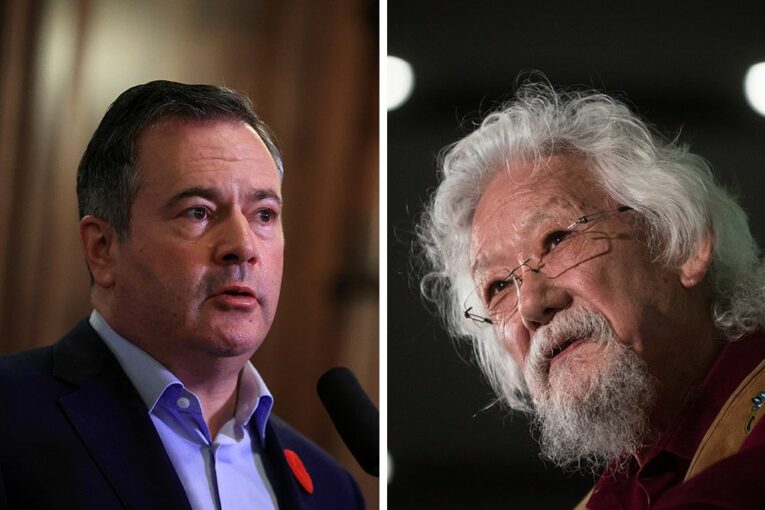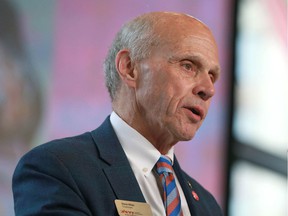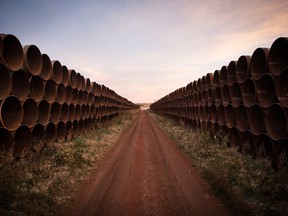
Everybody needs a good energy villain to blame these days.
David Suzuki has the oil and gas sector.
The Alberta government has Suzuki. Environmental groups have Jason Kenney.
The Biden administration has OPEC. And Keystone XL proponents have the U.S. president.
The season of finger-pointing has arrived in an increasingly chaotic energy transition.
“There’s an awful lot of political theatre around energy policy right now,” said Duane Bratt, a political scientist at Mount Royal University.
“It’s going to get worse.”
Let’s start with Suzuki in this whirlwind week of the energy blame game.
At a march held by Extinction Rebellion in Victoria last weekend, the well-known environmentalist chastised “resource-ism, a mindset that regards everything around as a potential opportunity for us . . . But what people like Jason Kenney and those folks over there don’t get is that nature doesn’t give a damn about human boundaries. There’s no Alberta air or Jason Kenney air . . . Net-zero by 2050, ha! What a joke. Canada has never met a single target it has promised to meet.”
It’s true that Canada has failed to reach its climate commitments, a point underscored by the release of a report Thursday by the country’s environment commissioner.
But speaking to CHEK News, Suzuki took it a step further.
“The next stage after this is there are going to be pipelines blown up if our leaders don’t pay attention to what’s going on.”
Suzuki later told the National Post he doesn’t support bombing energy pipelines, but added: “The violence is coming from the authorities.”
On Thursday, after a public backlash took off, Suzuki apologized for his remarks. In a statement, he said “any suggestion that violence is inevitable is wrong.”
Talk of anyone blowing up pipelines is divisive, to say the least.
To Alberta’s premier, it’s downright dangerous.
“It’s like in a gangster movie, where they say, ‘Nice little pipeline you’ve got there, it’d be terrible if something happened to it.’ This is totally irresponsible on the part of David Suzuki,” Kenney told reporters.
“It creates a context that some people could use to rationalize violence.”
Less than 24 hours after Kenney teed-off on Suzuki, a coalition of environmental groups blasted the premier over remarks and commentary from his government about the Public Inquiry into Anti-Alberta Energy Campaigns.
The groups, which include Environmental Defence Canada and Greenpeace Canada, are demanding the province apologize for statements on the government’s website that assert the Allan Inquiry “confirms the existence of well-funded, decade-long campaigns based on misinformation.”
The inquiry determined environmental groups opposed to oil and gas development in the province have received donations from outside Canada, at least $54 million over 16 years.
However, the final report noted it’s neither illegal nor improper.
In fact, the inquiry didn’t issue any findings “as to whether an organization has disseminated false or misleading information. Such a finding is not required by the (inquiry’s) terms of reference.”
The environmental groups say they’re considering launching a defamation lawsuit and want an apology by Nov. 30.
“We can’t let this kind of misinformation from a premier stand,” said Keith Stewart of Greenpeace Canada.
In response, Kenney’s office said it will “vigorously respond” in court, if necessary.
In other words, don’t hold your breath waiting for an apology.

Meanwhile, the Biden administration announced this week it will release crude from the U.S. Strategic Petroleum Reserve (SPR) to lower gasoline prices after the president failed to persuade OPEC+ to boost oil production.
U.S. gasoline prices have been soaring in recent months as travel resumes, averaging US$3.40 per gallon on Monday. That’s fully one-third higher than during the same period in 2019.
“The big part of the reason Americans are facing high gas prices is because oil-producing countries and large companies have not ramped up the supply of oil quickly enough to meet the demand,” Biden lamented.
This comes from the same president who shredded the necessary permit for the Keystone XL pipeline on his first day on the job.
Now, Keystone XL wouldn’t have solved a short-term supply crunch, but it would have shipped 830,000 barrels per day of western Canadian crude to U.S. refiners by 2023.
The project, which the Kenney government sank $1.3 billion into to see construction started last year, is now the subject of a NAFTA claim by the proponents, Calgary-based TC Energy.
TC Energy made a formal request on Monday for arbitration under NAFTA’s investor-state dispute settlement provisions to recover damages tied to the project’s demise.
Fuel analyst Dan McTeague, president of Canadians for Affordable Energy, said releasing oil from the reserve won’t tame high gasoline prices, but it does reinforce “the administration’s anti-fossil fuel policies have a cost” and projects such as Keystone XL are needed.
“What we are seeing is reality finally clobbering the narrative in this country and many other parts of the world that somehow you can do without fossil fuels,” said the former Liberal MP.

Political finger-pointing isn’t unusual, but these are more than just signs of a polarized debate in an era of decarbonization.
Energy economist Peter Tertzakian calls this a period of “disorderedly transition,” driven by the belief we’re quickly shifting off fossil fuels and the petroleum industry doesn’t require more investment, yet the pull for oil and natural gas remains strong.
Soaring natural gas prices in Europe and an energy crisis in Asia are harbingers of a bumpy road ahead — and reinforce the fact that consumers need access to reliable and affordable supplies.
“Instead of tackling assumptions and figuring out how we are going to drive the transition forward, we’re just finger-pointing,” Tertzakian, deputy director of the ARC Energy Research Institute, said in an interview Thursday.
“So be careful, because it’s not necessarily true that people are going to point their fingers at some of the root causes of what’s going on. They tend to look for scapegoats that are easy. Government is easy; the oil and gas industry is an easy scapegoat.
“So we are in for some turbulent times.”
And, it appears, it’s a tumultuous period with no shortage of blame looking for a place to land.
Chris Varcoe is a Calgary Herald columnist.
You can read more of the news on source
